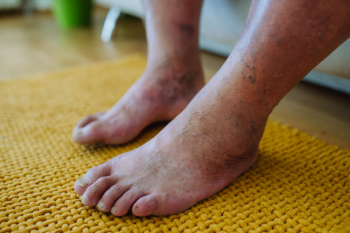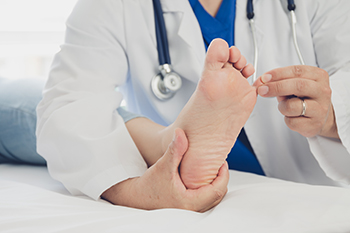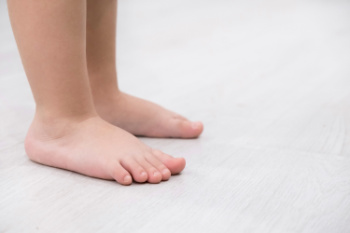

Diabetes can manifest in the feet through several noticeable signs. One common symptom is persistent numbness or tingling, often caused by nerve damage, known as diabetic neuropathy. This condition can lead to a loss of sensation, making it difficult to detect injuries or infections. Another sign is slow-healing sores or ulcers, which can develop from minor cuts or blisters due to poor circulation. Discoloration of the skin, such as redness, can indicate inflammation or infection. Swelling in the feet and ankles might also be present, signaling potential underlying issues. Additionally, changes in skin texture, including dryness or cracking, can occur. Fungal infections, particularly between the toes, are more frequent in diabetics. If you have diabetes, it is strongly suggested that you are under the care of a podiatrist who can help you manage this serious condition.
Diabetic foot care is important in preventing foot ailments such as ulcers. If you are suffering from diabetes or have any other concerns about your feet, contact Massimo Pietrantoni, DPM from Rochester Podiatry, LLP. Our doctor can provide the care you need to keep you pain-free and on your feet.
Diabetic Foot Care
Diabetes affects millions of people every year. The condition can damage blood vessels in many parts of the body, especially the feet. Because of this, taking care of your feet is essential if you have diabetes, and having a podiatrist help monitor your foot health is highly recommended.
The Importance of Caring for Your Feet
Patients with diabetes should have their doctor monitor their blood levels, as blood sugar levels play such a huge role in diabetic care. Monitoring these levels on a regular basis is highly advised.
It is always best to inform your healthcare professional of any concerns you may have regarding your feet, especially for diabetic patients. Early treatment and routine foot examinations are keys to maintaining proper health, especially because severe complications can arise if proper treatment is not applied.
If you have any questions please feel free to contact one of our offices located in Brighton and Greece of Rochester, NY . We offer the newest diagnostic and treatment technologies for all your foot and ankle needs.

Obesity significantly increases the risk of developing plantar fasciitis, a painful condition that affects the heel and arch of the foot. Excess body weight places strain on the plantar fascia, the thick tissue band connecting the heel bone to the toes, leading to inflammation and microtears. This pressure not only causes severe pain but can also prolong the healing process. Individuals who are overweight are more likely to experience persistent pain and difficulty with daily activities, such as walking or standing. Extra body weight adds to other factors that contribute to plantar fasciitis, such as poor foot mechanics and inadequate footwear. If you are experiencing symptoms like sharp heel pain, particularly in the morning, it is suggested that you make an appointment with a podiatrist. This medically trained foot doctor can examine your feet and suggest treatment that may include orthotics, specific exercises, and weight-related lifestyle adjustments.
The more you weigh, the harder your feet must work to support your body. If you’re an obese individual and are concerned about your feet, contact Massimo Pietrantoni, DPM from Rochester Podiatry, LLP. Our doctor can provide the care you need to keep you pain-free and on your feet.
Obesity and Your Feet
People who are overweight are putting more pressure on their ankles, knees, and hips as well as their feet. This unfortunately can lead to variety of different issues.
Problems & Complications Stemming from Obesity
If you have any questions, please feel free to contact one of our offices located in Brighton and Greece of Rochester, NY . We offer the newest diagnostic and treatment technologies for all your foot care needs.
 Krabbe disease is a rare, inherited disorder that affects the nervous system, including the feet. It is caused by a deficiency of a specific enzyme that leads to the accumulation of harmful substances in the brain and other tissues. This disease often manifests in infancy but can also appear later in life. Symptoms affecting the feet include muscle weakness, stiffness, and spasticity, which can result in difficulty walking or maintaining balance. Sensory loss and neuropathy, characterized by numbness or tingling, may also occur. Treatment primarily focuses on managing symptoms and slowing disease progression. Supportive care is important for maintaining mobility and comfort. Given the complexity and potential impact on foot health, if you have Krabbe disease, it is strongly suggested that you are under the care of a podiatrist who can help manage symptoms and improve your quality of life.
Krabbe disease is a rare, inherited disorder that affects the nervous system, including the feet. It is caused by a deficiency of a specific enzyme that leads to the accumulation of harmful substances in the brain and other tissues. This disease often manifests in infancy but can also appear later in life. Symptoms affecting the feet include muscle weakness, stiffness, and spasticity, which can result in difficulty walking or maintaining balance. Sensory loss and neuropathy, characterized by numbness or tingling, may also occur. Treatment primarily focuses on managing symptoms and slowing disease progression. Supportive care is important for maintaining mobility and comfort. Given the complexity and potential impact on foot health, if you have Krabbe disease, it is strongly suggested that you are under the care of a podiatrist who can help manage symptoms and improve your quality of life.
Some foot conditions may require additional professional care. If you have any concerns, contact Massimo Pietrantoni, DPM of Rochester Podiatry, LLP. Our doctor can provide the care you need to keep you pain-free and on your feet.
Rare Foot Conditions
The majority of foot conditions are common and can be treated by a podiatrist. Standard diagnostic procedures are generally used to identify specific conditions and treatment can be rendered. A podiatrist also treats rare foot conditions which can be difficult to diagnose and may need extra attention and care.
There are many rare foot conditions that can affect children. Some of these can include:
Freiberg’s disease - This can be seen as a deterioration and flattening of a metatarsal bone that exists in the ball of the foot. It typically affects pre-teen and teenage girls, but can affect anyone at any age. Symptoms that can accompany this can be swelling, stiffness, and the patient may limp.
Kohler’s disease - This often targets the bone in the arch of the foot and affects younger boys. It can lead to an interruption of the blood supply which ultimately can lead to bone deterioration. The patient may limp or experience tenderness, swelling, and redness.
Maffucci syndrome - This affects the long bones in a child’s foot leading to the development of abnormal bone lesions. They are benign growths and typically develop in early childhood and the bones may be susceptible to breaking.
A podiatrist can properly diagnose and treat all types of rare foot conditions. If your child is affected by any of these symptoms or conditions, please don’t hesitate to call our office so the correct treatment method can begin.
If you have any questions please feel free to contact one of our offices located in Brighton and Greece of Rochester, NY . We offer the newest diagnostic tools and technology to treat your foot and ankle needs.

Flat feet, medically termed pes planus, is a common condition among children, indicated by a lack of arch in the foot. While many children naturally outgrow flat feet as they develop, some may experience persistent symptoms that warrant attention. The causes of flat feet in children vary, including genetics, lax ligaments, muscle weakness, or developmental abnormalities. Additionally, factors like obesity, improper footwear, or excessive standing can worsen the condition. Identifying flat feet in children involves observing certain signs, such as foot pain, fatigue, or an uneven gait. Although flat feet often do not cause significant issues, severe cases may lead to discomfort and difficulty walking. They may even contribute to other lower limb problems later in life. Management strategies typically focus on alleviating symptoms through supportive footwear, orthotic inserts, or stretching exercises. If your child does not gradually develop arches in their feet, it is suggested that a podiatrist be consulted who can conduct an exam and monitor flat feet.
Making sure that your children maintain good foot health is very important as they grow. If you have any questions, contact Massimo Pietrantoni, DPM of Rochester Podiatry, LLP. Our doctor can provide the care you need to keep you pain-free and on your feet.
Keeping Children's Feet Healthy
Having healthy feet during childhood can help prevent medical problems later in life, namely in the back and legs. As children grow, their feet require different types of care. Here are some things to consider...
Although babies do not walk yet, it is still very important to take care of their feet.
Avoid putting tight shoes or socks on his or her feet.
Allow the baby to stretch and kick his or her feet to feel comfortable.
As a toddler, kids are now on the move and begin to develop differently. At this age, toddlers are getting a feel for walking, so don’t be alarmed if your toddler is unsteady or ‘walks funny’.
As your child gets older, it is important to teach them how to take care of their feet.
Show them proper hygiene to prevent infections such as fungus.
Be watchful for any pain or injury.
Have all injuries checked by a doctor as soon as possible.
Comfortable, protective shoes should always be worn, especially at play.
If you have any questions please feel free to contact one of our offices located in Brighton and Greece of Rochester, NY . We offer the newest diagnostic and treatment technologies for all your foot and ankle needs.